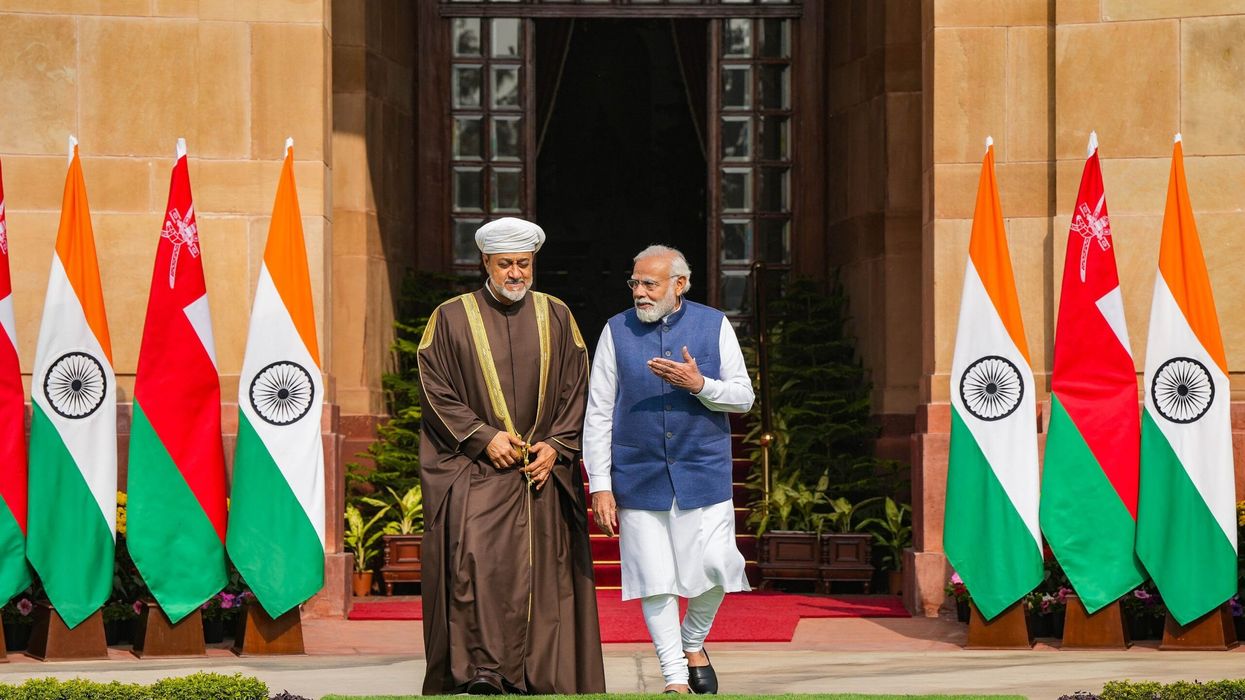Prime Minister of India, Narendra Modi, and the Sultan of Oman Haitham bin Tarik on Saturday (16), adopted a vision document aimed at bolstering cooperation in approximately 10 crucial sectors.
Their "productive" discussions focused on reviving India-Oman strategic ties and emphasised the need to swiftly conclude a comprehensive economic partnership agreement (CEPA).
Modi and the Omani ruler also discussed the situation arising out of the Hamas-Israel conflict, the challenge of terrorism as well as the larger need to try and achieve a two-state solution to the Palestine issue as a way forward, according to foreign secretary Vinay Kwatra.
The two sides also announced the third tranche of Oman-India joint investment fund worth $300 million (around Rs 2,500 crore) that would be used for channelising investment into the fastest growing sectors of the Indian economy.
The investment fund was started as a 50:50 joint venture between the SBI and Oman investment authority with the first tranche of $100 million and the second one of $200 million.
At a media briefing, the foreign secretary said India and Oman also signed agreements providing for cooperation in the field of information technology, combating financial crimes, culture and one for the establishment of a Hindi chair of the Indian Council of Cultural Relations in Oman.
The Sultan of Oman arrived in Delhi on a state visit on Friday - his first trip to India as the top leader of the influential Gulf nation.
"Today is a historic day in India-Oman relations as the Sultan of Oman is on a state visit to India after 26 years," Modi said in his remarks at the delegation-level dialogue.
"On the basis of our successful engagements, we are creating a path of bright future today," he said, referring to the joint vision document.
"In this joint vision, concrete action points have been agreed upon in 10 different areas. I am confident that it will give a new and modern shape to our partnership," he added.
"I am happy that the discussion on the CEPA agreement is going on and two rounds of discussion have been successfully completed where many important issues have been agreed upon," Modi said.
Expressing hope that both sides will soon be able to sign the pact, Modi said it will add a new dimension to their economic cooperation.
Describing the talks between Modi and the visiting leader as "comprehensive and constructive", Kwatra said the India-Oman vision document focuses on building a partnership in 8-to-10 areas including maritime cooperation and connectivity, digital payments, space, green energy, tourism, agriculture, food security and cricket.
The cooperation in clean energy will also focus on green hydrogen.
The vision document is broadly rooted in Oman's 'Vision 2040', which is its national development blueprint, and India's development vision of 'Amritkaal'.
"An area which featured very prominently in the talks between the two leaders was ongoing discussions between the two countries for a comprehensive economic partnership agreement," Kwatra said.
"Although the negotiations on CEPA have started only recently, they have made substantial progress in the last few rounds of discussion and both leaders gave strong impetus and push to conclude the CEPA agreement as early as possible," he said.
There was also a discussion on the possibility of Oman utilising India's digital payment system UPI with a corresponding Omani platform, besides an exchange of views on trade in Rupee.
To a question, Kwatra said the challenges arising out of the conflict in Gaza were definitely an important element of discussions.
"There was a shared appreciation of the continuing challenge that both countries face from the emerging multiple dimensions of the conflict, including the catastrophic humanitarian situation which is there," Kwatra said on the Hamas-Israel conflict.
He said the challenge of terrorism and the larger need to try and achieve a two-state solution as a way forward was discussed.
"With regard to the situation there, it was discussed and both leaders exchanged in detail their perspective of the situation there," he said.
India and the Sultanate of Oman are strategic partners and the bilateral trade and investment relationship between the two nations has been on an upswing in the last few years.
(PTI)




